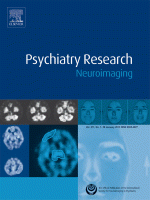Psychiatry Research: Neuroimaging
Psychiatry Research: Neuroimaging is a peer-reviewed scientific journal that focuses on the application of neuroimaging techniques to explore the structure, function, and biochemistry of the brain in relation to psychiatric disorders and mental health. Neuroimaging encompasses a range of techniques such as magnetic resonance imaging (MRI), functional magnetic resonance imaging (fMRI), positron emission tomography (PET), single photon emission computed tomography (SPECT), and electroencephalography (EEG), which are pivotal in advancing our understanding of the biological underpinnings of mental illnesses.
Overview[edit | edit source]
The journal publishes original research articles, reviews, and brief reports detailing significant advances in the field of psychiatric neuroimaging. Topics covered include, but are not limited to, the use of neuroimaging methods to investigate the neural mechanisms of psychiatric conditions, the development of novel imaging techniques for psychiatric research, and the application of neuroimaging in the evaluation of treatment responses in mental health disorders.
Importance in Psychiatry[edit | edit source]
Psychiatry Research: Neuroimaging plays a crucial role in bridging the gap between neuroscience and clinical psychiatry. By elucidating the brain structures and functions associated with psychiatric disorders, neuroimaging research contributes to a better understanding of these conditions, potentially leading to improved diagnosis, treatment, and prevention strategies. The journal's focus on cutting-edge research makes it a valuable resource for psychiatrists, neuroscientists, and clinical psychologists interested in the neurobiological aspects of mental health.
Submission and Review Process[edit | edit source]
The journal employs a rigorous peer-review process to ensure the publication of high-quality research. Manuscripts submitted to Psychiatry Research: Neuroimaging undergo a thorough evaluation by experts in the field, who assess the scientific validity, originality, and significance of the work. This process is critical in maintaining the journal's reputation as a reputable source of knowledge in psychiatric neuroimaging.
Access and Distribution[edit | edit source]
Psychiatry Research: Neuroimaging is available in both print and online formats, making it accessible to a wide audience of researchers, clinicians, and students. The online version often allows for the inclusion of supplementary materials, such as additional figures, tables, and sometimes even video content, which can enhance the reader's understanding of the research findings.
Impact on Mental Health Research[edit | edit source]
The insights gained from neuroimaging studies published in Psychiatry Research: Neuroimaging have profound implications for mental health research. They contribute to the development of a more nuanced understanding of the neurobiological mechanisms underlying psychiatric disorders, which is essential for the creation of more effective and personalized treatment approaches. Furthermore, neuroimaging research can inform public health policies by providing evidence-based recommendations for the prevention of mental health disorders.
Search WikiMD
Ad.Tired of being Overweight? Try W8MD's physician weight loss program.
Semaglutide (Ozempic / Wegovy and Tirzepatide (Mounjaro / Zepbound) available.
Advertise on WikiMD
|
WikiMD's Wellness Encyclopedia |
| Let Food Be Thy Medicine Medicine Thy Food - Hippocrates |
Translate this page: - East Asian
中文,
日本,
한국어,
South Asian
हिन्दी,
தமிழ்,
తెలుగు,
Urdu,
ಕನ್ನಡ,
Southeast Asian
Indonesian,
Vietnamese,
Thai,
မြန်မာဘာသာ,
বাংলা
European
español,
Deutsch,
français,
Greek,
português do Brasil,
polski,
română,
русский,
Nederlands,
norsk,
svenska,
suomi,
Italian
Middle Eastern & African
عربى,
Turkish,
Persian,
Hebrew,
Afrikaans,
isiZulu,
Kiswahili,
Other
Bulgarian,
Hungarian,
Czech,
Swedish,
മലയാളം,
मराठी,
ਪੰਜਾਬੀ,
ગુજરાતી,
Portuguese,
Ukrainian
Medical Disclaimer: WikiMD is not a substitute for professional medical advice. The information on WikiMD is provided as an information resource only, may be incorrect, outdated or misleading, and is not to be used or relied on for any diagnostic or treatment purposes. Please consult your health care provider before making any healthcare decisions or for guidance about a specific medical condition. WikiMD expressly disclaims responsibility, and shall have no liability, for any damages, loss, injury, or liability whatsoever suffered as a result of your reliance on the information contained in this site. By visiting this site you agree to the foregoing terms and conditions, which may from time to time be changed or supplemented by WikiMD. If you do not agree to the foregoing terms and conditions, you should not enter or use this site. See full disclaimer.
Credits:Most images are courtesy of Wikimedia commons, and templates Wikipedia, licensed under CC BY SA or similar.
Contributors: Prab R. Tumpati, MD

